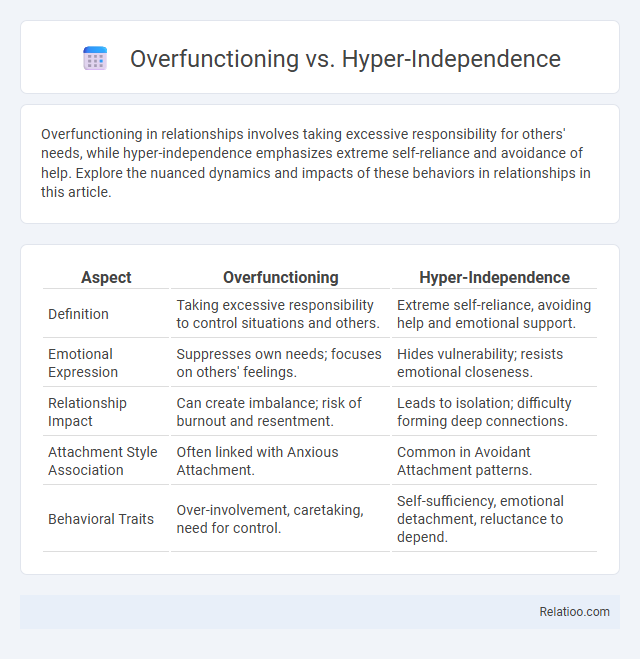Overfunctioning in relationships involves taking excessive responsibility for others' needs, while hyper-independence emphasizes extreme self-reliance and avoidance of help. Explore the nuanced dynamics and impacts of these behaviors in relationships in this article.
Table of Comparison
| Aspect | Overfunctioning | Hyper-Independence |
|---|---|---|
| Definition | Taking excessive responsibility to control situations and others. | Extreme self-reliance, avoiding help and emotional support. |
| Emotional Expression | Suppresses own needs; focuses on others' feelings. | Hides vulnerability; resists emotional closeness. |
| Relationship Impact | Can create imbalance; risk of burnout and resentment. | Leads to isolation; difficulty forming deep connections. |
| Attachment Style Association | Often linked with Anxious Attachment. | Common in Avoidant Attachment patterns. |
| Behavioral Traits | Over-involvement, caretaking, need for control. | Self-sufficiency, emotional detachment, reluctance to depend. |
Understanding Overfunctioning: Definition and Signs
Overfunctioning refers to taking on excessive responsibility or control in relationships or situations, often to compensate for others' perceived inadequacies. Key signs include chronic people-pleasing, difficulty delegating tasks, and ignoring personal needs to maintain order or support others. This pattern can lead to burnout, resentment, and unhealthy relational dynamics due to the imbalance it creates.
What is Hyper-Independence? Key Characteristics
Hyper-independence is a coping mechanism characterized by an excessive reliance on oneself to avoid vulnerability or dependence on others. Key characteristics include an intense need for control, reluctance to ask for help, and a tendency to suppress emotions to maintain self-sufficiency. Unlike overfunctioning, which involves taking on others' responsibilities, hyper-independence centers on avoiding perceived weakness by prioritizing autonomy above collaboration.
The Psychological Roots of Overfunctioning
Overfunctioning often stems from deep psychological roots such as childhood conditioning, fear of vulnerability, or a need for control in chaotic environments. Hyper-independence manifests as an intense self-reliance rooted in trauma or past neglect, where relying on others feels unsafe or threatening. Understanding these patterns can help you recognize how overfunctioning behaviors may serve as a protective mechanism against emotional discomfort or abandonment.
Causes and Triggers of Hyper-Independence
Hyper-independence often stems from early experiences of neglect, trauma, or inconsistent caregiving, leading individuals to rely solely on themselves to feel safe or competent. Triggers for hyper-independence include situations where vulnerability or dependence might expose perceived weaknesses, reinforcing a defensive self-reliance mechanism. This contrasts with overfunctioning, which is driven by a need to control or manage others' responsibilities, typically motivated by anxiety about outcomes or interpersonal dynamics.
Overfunctioning vs Hyper-Independence: Core Differences
Overfunctioning involves taking on excessive responsibility to control outcomes or compensate for others' perceived inadequacies, often leading to burnout and strained relationships. Hyper-independence is characterized by an intense reliance on oneself, avoiding help or vulnerability to maintain autonomy and emotional distance. The core difference lies in overfunctioning's external focus on others' needs versus hyper-independence's internal focus on self-sufficiency and emotional self-protection.
Emotional Impact on Relationships
Overfunctioning often leads to emotional exhaustion, causing strain in relationships as you may feel unappreciated or overwhelmed by carrying too much responsibility. Hyper-independence can create emotional distance, making it difficult for partners or friends to connect deeply due to your reluctance to seek or accept help. Both dynamics disrupt emotional balance, reducing intimacy and mutual support, which are essential for healthy, nurturing relationships.
Overfunctioning and Burnout: The Hidden Cost
Overfunctioning often leads to burnout as you take on excessive responsibilities to compensate for others, ignoring your own needs and limits. This hidden cost can result in chronic stress, emotional exhaustion, and decreased overall well-being. Recognizing the difference between healthy independence and overfunctioning is essential to protect your mental health and sustain long-term productivity.
Hyper-Independence and Social Isolation
Hyper-independence often leads to social isolation due to an intense need to handle problems alone, which can hinder forming meaningful connections and relying on others. Overfunctioning involves taking excessive responsibility for others' tasks, while hyper-independence pushes you to avoid help altogether, amplifying feelings of loneliness and disconnection. Recognizing these patterns helps you balance self-reliance with healthy social engagement, preventing isolation and fostering supportive relationships.
Healing Pathways: Breaking the Patterns
Healing pathways for overfunctioning, hyper-independence, and related patterns involve recognizing your tendency to take on excessive responsibility as a coping mechanism. Developing emotional awareness and establishing healthy boundaries empower you to shift from over-controlling behaviors to balanced interdependence. Therapeutic approaches, such as mindful self-compassion and relational therapy, provide tools to break these cycles and foster authentic connection and self-care.
Fostering Healthy Interdependence
Overfunctioning, hyper-independence, and overfunctioning often stem from a desire to control or avoid vulnerability, but fostering healthy interdependence requires balancing self-reliance with mutual support. Your growth benefits from recognizing when to seek help and share responsibilities, allowing relationships to thrive through cooperation and trust. Embracing vulnerability and communication strengthens bonds, creating a foundation where both independence and connection coexist sustainably.

Infographic: Overfunctioning vs Hyper-Independence
 relatioo.com
relatioo.com